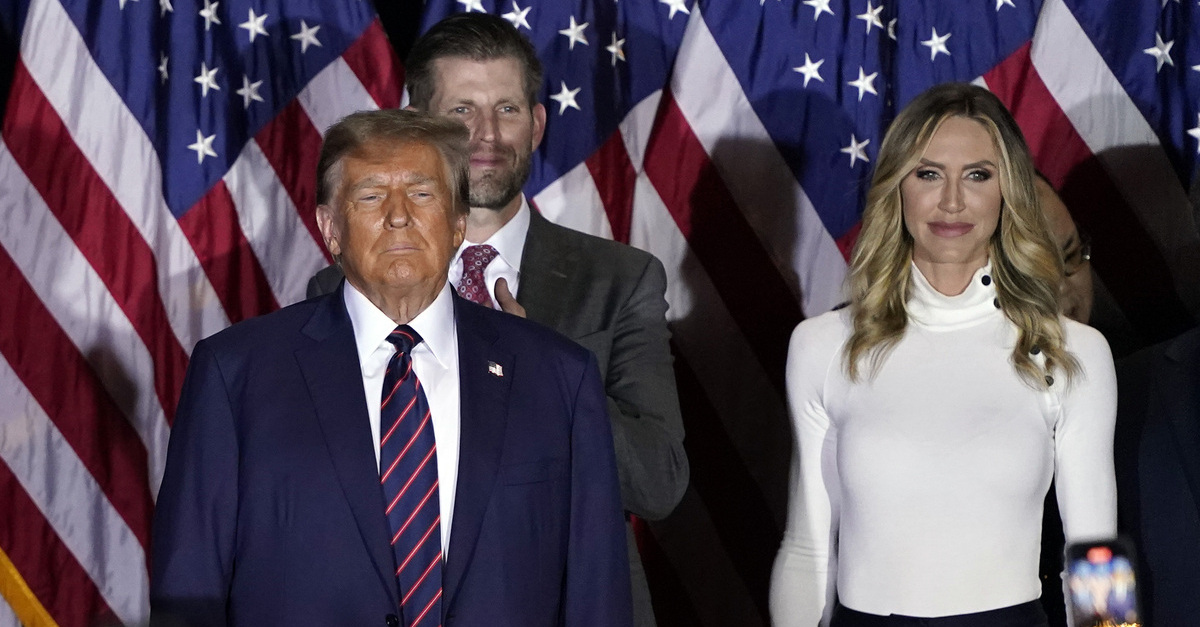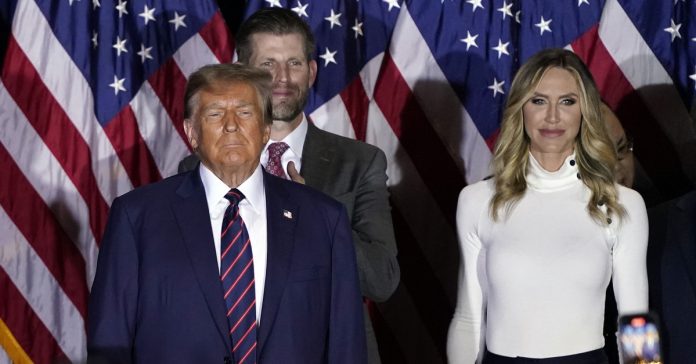
FILE — Republican presidential candidate former President Donald Trump arrives to speak at a primary election night party in Nashua, N.H., Tuesday, Jan. 23, 2024, with Eric and Lara Trump. Trump is calling for a leadership change at the Republican National Committee in an attempt to install a new slate of loyalists — including his daughter-in-law — at the top of the GOP’s political machine even before he formally secures the party’s next presidential nomination. (AP Photo/Pablo Martinez Monsivais, File)
Several constitutional law professors have weighed in on former President Donald Trump’s last-ditch plea for presidential immunity over his Jan. 6 charges, saying Trump’s most recent efforts to convince the U.S. Supreme Court to pause the criminal case should be rejected “in accordance with the text and history of the Constitution, as well as the separation of powers principles that undergird it.”
And, the brief says, it’s a relatively easy call.
“[S]ometimes even the most fundamental questions of constitutional interpretation can yield a straightforward answer,” the scholars argue in their friend of the court filing. “This is one such case.”
University of Missouri School of Law Professor Frank O. Bowman, III, University of North Carolina School of Law Professor Michael J. Gerhardt, Michigan State University College of Law Professor Brian C. Kalt, and New York University School of Law Peter M. Shane signed the amicus brief filed with the nation’s high court on Tuesday.
Late Monday, Trump asked the nine justices to indefinitely stay the federal case against him filed by special counsel Jack Smith for his defense attorneys to prepare and then file a thorough appeal with the Supreme Court that could eventually lead to oral arguments and a precedent-setting ruling on presidential immunity.
For now, the 45th president’s arguments on immunity have been rejected at both the district court and the appellate court levels. In the latter case, however, those immunity arguments were, so far, only shut down by a three-judge panel. Under the current procedural orders issued by the Washington, D.C.-based appeals court, the case was slated to return to the trial court level, where it would likely be set for trial before the traditional appeals process plays out.
Stylized as constitutional law scholars, the professors elide those procedural niceties to argue the merits of the case. They say the law, history, and facts are not on Trump’s side.
“Trump argues that he enjoys absolute immunity from criminal prosecution for actions committed during his tenure as president, and that his acquittal at an impeachment trial bars his subsequent prosecution,” the brief reads. “Both arguments reflect a misreading of constitutional text and history as well as this Court’s precedent.”
Trump, by way of his attorneys, has argued that former presidents are entitled to sweeping and total immunity — which would place the already-powerful office of the U.S. presidency entirely beyond legal reproach. In filings, the ex-president has also argued that sitting presidents “can never be examinable by the courts.”
“Trump’s argument that former presidents are forever immune from criminal prosecution for actions taken while in office finds no support in the Constitution’s text and history,” the brief reads. “[T]he Constitution does not explicitly provide immunity to sitting or former presidents.”
The scholars say the framers of the Constitution sought, instead, to distinguish an American president from the British king by making sure the national executive “may be indicted and punished” after “commit[ting] crimes against the state,” according to the brief.
To bolster their argument, the law professors note that some state constitutions that existed “at the time of the Framing” provided “express criminal immunities” to sitting governors — while the Constitution itself lacks any such language about criminal immunity.
“In other words,” the brief argues, the men who penned the Constitution “certainly knew how to draft immunity language,” and if they intended to create criminal immunity or some other such privilege for the presidency, “they could have done so” but “did not.”
During a hearing in early January, defense attorney John Sauer argued that the only acceptable recourse against a U.S. president accused of crimes is impeachment by the House of Representatives and conviction by the Senate. Then, and only then, Sauer said, could a theoretical criminal prosecution against a president move forward.
That understanding of the law and Constitution is wrong, too, the group of constitutional law professors argue.
“Trump’s argument that the Impeachment Judgment Clause bars his prosecution is at odds with its text and misreads its history,” the brief reads. “In prescribing that a ‘Party convicted’ is subject to indictment, the Clause does not silently prohibit indictment of a party acquitted in impeachment proceedings. Instead, the Clause makes clear that while the only penalty that the Senate can impose following impeachment is removal from office, a ‘Party convicted’ may still be subject to additional punishment through the nation’s criminal system.”
History itself also lends itself to a refutation of Trump’s arguments, the scholars say. Instructive are the cases of Aaron Burr, who was indicted for murder and never claimed presidential immunity, Richard Nixon, who was pardoned before he was likely to be indicted over the Watergate scandal, and Bill Clinton, who signed an agreement with prosecutors to avoid indictment for lying under oath.
To the extent any such evidence does support the idea of presidential immunity, the brief adds, that would only apply to sitting presidents.
“None of it supports Trump’s broad argument that a president remains forever immune from criminal liability even after leaving office,” the brief reads.
Presidents are immune from certain civil litigation, the constitutional professors concede. And, their brief argues, Trump has attempted to confuse a Supreme Court ruling on the subject with his criminal case in the capital district — where he faces four conspiracy charges.
“As the framers and ratifiers of our Constitution recognized, no man is ‘above the laws,’ nor ‘better than his fellow-citizens,”” the brief concludes. “Even the president, therefore, is ‘punishable by the laws of his country.’ This Court should reject the former president’s arguments to the contrary.”
Have a tip we should know? [email protected]

